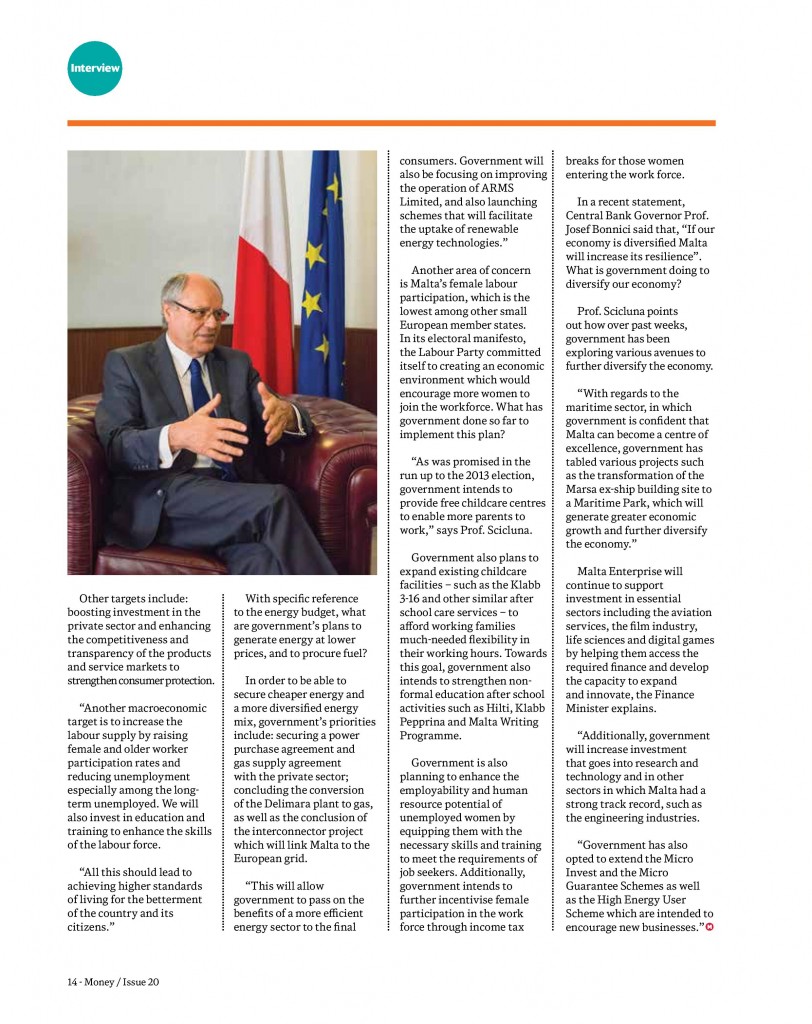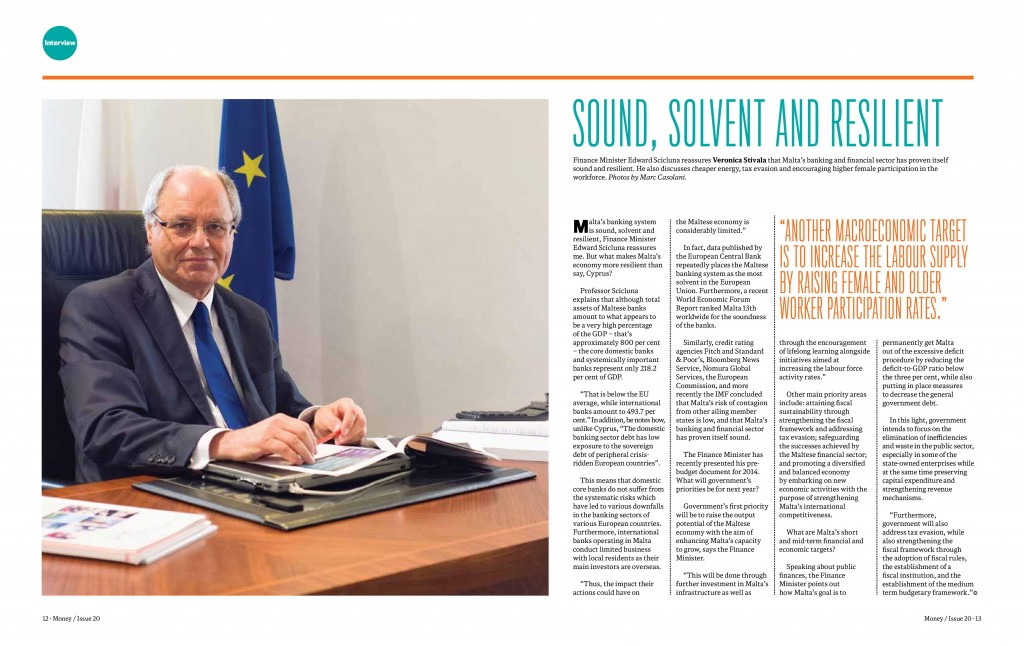Malta’s banking system is sound, solvent and resilient, Finance Minister Edward Scicluna reassures me. But what makes Malta’s economy more resilient than say, Cyprus?
Professor Scicluna explains that although total assets of Maltese banks amount to what appears to be a very high percentage of the GDP – that’s approximately 800 per cent – the core domestic banks and systemically important banks represent only 218.2 per cent of GDP.
“That is below the EU average, while international banks amount to 493.7 per cent.” In addition, he notes how, unlike Cyprus, “The domestic banking sector debt has low exposure to the sovereign debt of peripheral crisis ridden European countries”.
This means that domestic core banks do not suffer from the systematic risks which have led to various downfalls in the banking sectors of various European countries. Furthermore, international banks operating in Malta conduct limited business with local residents as their main investors are overseas.
“Thus, the impact their actions could have on the Maltese economy is considerably limited.”
In fact, data published by the European Central Bank repeatedly places the Maltese banking system as the most solvent in the European Union. Furthermore, a recent World Economic Forum Report ranked Malta 13th worldwide for the soundness of the banks.
Similarly, credit rating agencies Fitch and Standard & Poor’s, Bloomberg News Service, Nomura Global Services, the European Commission, and more recently the IMF concluded that Malta’s risk of contagion from other ailing member states is low, and that Malta’s banking and financial sector has proven itself sound.
The Finance Minister has recently presented his prebudget document for 2014.
What will government’s priorities be for next year?
Government’s first priority will be to raise the output potential of the Maltese economy with the aim of enhancing Malta’s capacity to grow, says the Finance Minister.
“This will be done through further investment in Malta’s infrastructure as well as through the encouragement of lifelong learning alongside initiatives aimed at increasing the labour force activity rates.”
Other main priority areas include: attaining fiscal sustainability through strengthening the fiscal framework and addressing tax evasion; safeguarding the successes achieved by the Maltese financial sector; and promoting a diversified and balanced economy by embarking on new economic activities with the purpose of strengthening
Malta’s international competitiveness.
What are Malta’s short and mid-term financial and economic targets?
Speaking about public finances, the Finance Minister points out how Malta’s goal is to permanently get Malta out of the excessive deficit procedure by reducing the deficit-to-GDP ratio below the three per cent, while also putting in place measures to decrease the general government debt.
In this light, government intends to focus on the elimination of inefficiencies and waste in the public sector, especially in some of the state-owned enterprises while at the same time preserving capital expenditure and strengthening revenue mechanisms.
“Furthermore, government will also address tax evasion, while also strengthening the fiscal framework through the adoption of fiscal rules, the establishment of a fiscal institution, and the establishment of the medium term budgetary framework.”
Other targets include:
boosting investment in the private sector and enhancing the competitiveness and transparency of the products and service markets to strengthen consumer protection.
“Another macroeconomic target is to increase the labour supply by raising female and older worker participation rates and reducing unemployment especially among the longterm unemployed. We will also invest in education and training to enhance the skills of the labour force.
“All this should lead to achieving higher standards of living for the betterment of the country and its citizens.”
With specific reference to the energy budget, what are government’s plans to generate energy at lower prices, and to procure fuel?
In order to be able to secure cheaper energy and a more diversified energy mix, government’s priorities include: securing a power purchase agreement and gas supply agreement with the private sector;
concluding the conversion of the Delimara plant to gas, as well as the conclusion of the interconnector project which will link Malta to the European grid.
“This will allow government to pass on the benefits of a more efficient energy sector to the final consumers. Government will also be focusing on improving the operation of ARMS Limited, and also launching schemes that will facilitate the uptake of renewable energy technologies.”
Another area of concern is Malta’s female labour participation, which is the lowest among other small European member states. In its electoral manifesto, the Labour Party committed itself to creating an economic environment which would encourage more women to join the workforce. What has government done so far to implement this plan?
“As was promised in the run up to the 2013 election, government intends to provide free childcare centres to enable more parents to work,” says Prof. Scicluna.
Government also plans to expand existing childcare facilities – such as the Klabb 3-16 and other similar after school care services – to afford working families much-needed flexibility in their working hours. Towards this goal, government also intends to strengthen nonformal education after school activities such as Hilti, Klabb Pepprina and Malta Writing Programme.
Government is also planning to enhance the employability and human resource potential of unemployed women by equipping them with the necessary skills and training
to meet the requirements of job seekers. Additionally, government intends to further incentivise female participation in the work force through income tax breaks for those women entering the work force.
 In a recent statement, Central Bank Governor Prof. Josef Bonnici said that, “If our economy is diversified Malta will increase its resilience”. What is government doing to diversify our economy?
In a recent statement, Central Bank Governor Prof. Josef Bonnici said that, “If our economy is diversified Malta will increase its resilience”. What is government doing to diversify our economy?
Prof. Scicluna points out how over past weeks, government has been exploring various avenues to further diversify the economy.
“With regards to the maritime sector, in which government is confident that Malta can become a centre of excellence, government has tabled various projects such as the transformation of the Marsa ex-ship building site to a Maritime Park, which will generate greater economic growth and further diversify the economy.”
Malta Enterprise will continue to support investment in essential sectors including the aviation services, the film industry, life sciences and digital games by helping them access the required finance and develop the capacity to expand and innovate, the Finance Minister explains.
“Additionally, government will increase investment that goes into research and technology and in other sectors in which Malta had a strong track record, such as the engineering industries.
“Government has also opted to extend the Micro Invest and the Micro Guarantee Schemes as well as the High Energy User Scheme which are intended to encourage new businesses.”
– Wednesday, 18th September, 2013



64 responses to “Interview – Money Magazine”
buying prescription drugs in mexico: mexican pharmacy – buying from online mexican pharmacy
mexican pharmaceuticals online
https://cmqpharma.com/# buying prescription drugs in mexico
mexican mail order pharmacies
pharmacies in mexico that ship to usa: medicine in mexico pharmacies – best online pharmacies in mexico
http://canadapharmast.com/# canadian pharmacies online
http://canadapharmast.com/# canadian online pharmacy reviews
canadian drug: maple leaf pharmacy in canada – canada discount pharmacy
pharmacy website india online shopping pharmacy india india pharmacy mail order
best online pharmacies in mexico: mexico pharmacy – medicine in mexico pharmacies
top online pharmacy india: buy medicines online in india – india pharmacy
canadian pharmacies online: canadian pharmacy online – canada rx pharmacy world
canadian pharmacy antibiotics: buy drugs from canada – buying drugs from canada
medicine in mexico pharmacies mexican drugstore online best online pharmacies in mexico
mexican pharmacy mexico pharmacy best online pharmacies in mexico
http://indiapharmast.com/# cheapest online pharmacy india
п»їbest mexican online pharmacies: reputable mexican pharmacies online – mexico drug stores pharmacies
https://canadapharmast.online/# ed meds online canada
legitimate canadian online pharmacies: canadian family pharmacy – the canadian drugstore
best online pharmacies in mexico: buying prescription drugs in mexico – pharmacies in mexico that ship to usa
medicine in mexico pharmacies: reputable mexican pharmacies online – mexican pharmacy
mexican pharmacy: mexico pharmacy – mexican mail order pharmacies
canadian pharmacy service legal canadian pharmacy online maple leaf pharmacy in canada
certified canadian international pharmacy legitimate canadian pharmacy online canadian pharmacy ltd
purple pharmacy mexico price list: mexican rx online – buying prescription drugs in mexico
https://indiapharmast.com/# online shopping pharmacy india
http://foruspharma.com/# mexico drug stores pharmacies
legit canadian pharmacy: canadian pharmacy india – trustworthy canadian pharmacy
Online medicine order: india pharmacy mail order – reputable indian pharmacies
buying from online mexican pharmacy: purple pharmacy mexico price list – mexican border pharmacies shipping to usa
canadian pharmacy mall: canadadrugpharmacy com – legal to buy prescription drugs from canada
mexican mail order pharmacies: buying prescription drugs in mexico online – mexican border pharmacies shipping to usa
best online pharmacy india: pharmacy website india – buy prescription drugs from india
buying prescription drugs in mexico: buying from online mexican pharmacy – mexico drug stores pharmacies
online pharmacy india: indian pharmacy paypal – top 10 pharmacies in india
https://amoxildelivery.pro/# amoxicillin 500mg capsule cost
paxlovid pill: paxlovid pill – paxlovid for sale
doxycycline 100mg capsules price: doxycycline 100mg india – doxycycline 50mg tablets
http://amoxildelivery.pro/# buy amoxicillin from canada
https://paxloviddelivery.pro/# paxlovid india
http://clomiddelivery.pro/# can you get generic clomid pills
doxycycline cheap uk: doxycline – doxycycline 250 mg
order amoxicillin uk: buy amoxicillin 500mg usa – antibiotic amoxicillin
https://doxycyclinedelivery.pro/# medication doxycycline 100mg
http://doxycyclinedelivery.pro/# cost doxycycline
http://paxloviddelivery.pro/# paxlovid pill
paxlovid price: п»їpaxlovid – paxlovid for sale
paxlovid india: paxlovid price – Paxlovid over the counter
https://paxloviddelivery.pro/# paxlovid price
http://doxycyclinedelivery.pro/# doxycycline 50 mg price uk
http://paxloviddelivery.pro/# paxlovid price
https://amoxildelivery.pro/# generic amoxil 500 mg
п»їpaxlovid: paxlovid covid – paxlovid cost without insurance
generic amoxicillin online: amoxicillin without prescription – medicine amoxicillin 500
http://clomiddelivery.pro/# can i get clomid pill
https://amoxildelivery.pro/# amoxicillin discount coupon
http://ciprodelivery.pro/# ciprofloxacin 500mg buy online
buy paxlovid online: paxlovid pharmacy – Paxlovid over the counter
paxlovid buy: п»їpaxlovid – paxlovid pill
https://doxycyclinedelivery.pro/# cheapest doxycycline tablets
http://ciprodelivery.pro/# ciprofloxacin
https://clomiddelivery.pro/# cheap clomid price
antibiotics cipro: cipro online no prescription in the usa – purchase cipro
buy paxlovid online: paxlovid generic – Paxlovid buy online
paxlovid for sale: Paxlovid buy online – paxlovid cost without insurance
where can i buy cheap clomid pill: order generic clomid pill – cost generic clomid